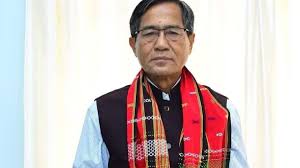The demolition drive in the Golchakkar area of Tripura has sparked intense debate and controversy, with the Leader of Opposition, Jitendra Chowdhury, stepping forward to call for its immediate cessation. Chowdhury has expressed grave concerns over the impact of the drive, highlighting the distress it has caused to many families in the West Tripura district. His appeal to Chief Minister Manik Saha emphasizes the need for a more humane approach to development and urban planning.
Chowdhury has described the demolition drive as unjust and inhuman, drawing attention to the plight of residents who have been left without shelter. Many families, according to Chowdhury, have lived in the area for decades, making the sudden uprooting of their lives not only traumatic but also unfair. The Opposition leader has strongly criticized the government’s lack of foresight and planning in executing the drive, accusing it of disregarding the welfare of its people in the name of infrastructure development.
Chowdhury has called on the Chief Minister to halt the ongoing demolitions and prioritize the provision of alternative housing and fair compensation for the displaced. He has urged the government to acknowledge the sacrifices being demanded of citizens and to demonstrate a more compassionate stance toward those affected. His plea underscores the importance of balancing development with the rights and dignity of individuals, especially those belonging to vulnerable sections of society.
The government’s position on the matter has been met with mixed reactions. While officials have justified the drive as necessary for urban expansion and modernization, critics argue that it reflects a larger pattern of neglect toward marginalized communities. Chowdhury has pointed out that the government’s failure to provide adequate notice or consultation has exacerbated the suffering of those impacted, leaving them with little time or resources to find alternative solutions.
Residents of the Golchakkar area have shared harrowing stories of losing their homes and livelihoods overnight. Many have spoken out about the emotional and financial toll of the demolitions, with some families now living in makeshift shelters or relying on the support of neighbors and community members. The lack of clear communication and the absence of a resettlement plan have further fueled anger and frustration among those displaced.
Chowdhury’s appeal has resonated with civil society groups and activists, who have also called for an end to the demolitions. They have joined the Opposition leader in urging the government to adopt a more inclusive approach, one that takes into account the needs and aspirations of all citizens. Their advocacy has brought attention to the broader issue of equitable development and the need for policies that protect the rights of the underprivileged.
Chief Minister Manik Saha, meanwhile, has yet to issue a detailed response to Chowdhury’s demands. However, his administration has indicated a willingness to engage in dialogue with affected residents and explore potential solutions. Observers hope that this signals a shift toward a more conciliatory and collaborative approach, which could pave the way for a resolution that addresses the concerns of all stakeholders.
The controversy surrounding the Golchakkar demolition drive serves as a reminder of the challenges inherent in balancing development with social equity. It raises important questions about the role of government in safeguarding the interests of its most vulnerable citizens while pursuing progress. As public debate continues, the actions taken by the Tripura government in the coming weeks will be closely watched, both within the state and beyond.
Chowdhury’s intervention has shone a spotlight on the human cost of unchecked development, emphasizing the need for compassion and accountability in policymaking. His call to action has resonated with many, sparking a wider conversation about the kind of future that Tripura—and indeed the country as a whole—should strive to build. Whether this moment leads to meaningful change or fades into the background of political discourse remains to be seen, but the voices of those affected will undoubtedly continue to demand attention.


